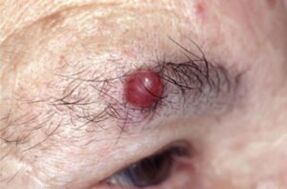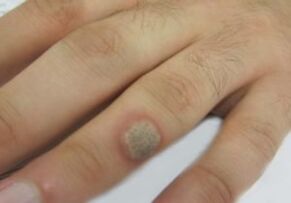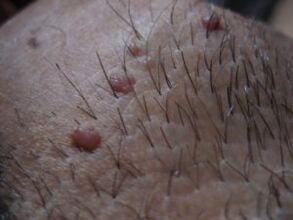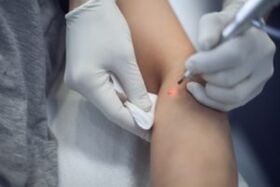
The human papilloma virus (HPV) is exclusively in the basal layer of the skin, and its reproduction occurs in the upper layers.This disease is characteristic of its chronic form with periodic relapses.
Read more about HPV, its description
HPV is infected with more than half the world's population.Some of them are simply carriers of the disease, while in others the virus manifests as papillomatosis of the skin, mucous membranes.Sometimes this viral disease can be the pathogen of cell cancer.HPV is an infection from the papovaviridea family, which can infect and change epithelial cells.This benign neoplasm is formed in every area of the body:
- neck
- under the chest;
- in the stomach;
- face;
- in the genitals;
- in axillary cavities;
- in the mucous membranes of the oral cavities, nose, lips;
- in the mucous membranes of the internal organs.
This infection belongs to intercellular parasites that are unable to reproduce independently, and use the cells of the human body for this.The virus introduces its DNA to human chromosomes and thus parasitizes for a long time.With a decrease in immunity, you can observe a noticeable activation of this disease.This fact determines the need to handle HPV.The development of this infection occurs in the cells of the body, but it may also exist outside it, but not long.Being in the cells of a living organism, it causes a failure in their separation.

Incubation period and stages of development
The incubation period of the virus is different.This type of virus is characterized by a hidden current.The subclinical form of the course of the disease is characteristic of the emergence of uncertainty during a simple examination of redness that cause discomfort for the patient in the genital area.You can immediately become infected with some types of papillomaviruses.Under the influence of several factors, the virus is activated and its reproduction begins, and the disease enters the period of clinical manifestations.In 90 % of cases at six months a year, self-healing occurs, in some cases, a chronic repetitive course can occur with a high probability of malignancy (depending on the type of virus).The disease persists in four stages (phases):
Stage 1 (initial) - latent course of papillomavirus infection.The virus is in the body, but it does not appear, it does not cause transformation into the cells.At this stage, it can be identified by PCR analysis;
2 - Clinical signs arise - in the form of growth in the skin.The virus causes an accelerated division of epidermal cells.At this stage, the virus is detected during PCR, cytology and histology (detected by the presence of hyperkeratosis);
3 - dysplasia.The structure of the cells (colocytosis) varies -this is visible under a microscope, as the DNA of the virus begins to interact with DNA cells and causes the development of the so -called, integrated form.PCR, cytology and methods of histology, as well as colposcopy;
Stage 4 - carcinoma.The development of the virus causes cell mutation and the appearance of malignant cells.Invasive cancer is formed.Diagnosis occurs in all of the above methods and in clinical manifestations.
Types of HPV
More than one hundred types of HPV are determined to infect the urogenital tract of a person affecting the epithelium of the skin and mucous membranes of the genitals - 35 species.For all types of HPV, a classification based on the types of manifestation, redness and other skin manifestations is used.Tipping HPV with a description looks like this:
- Different types of warts for their appearance, HPV Type 1-5 is responsible;
- Subanar warts (they look like a corn) -1-4 types of HPV.They are usually formed in those places where corn or compression occur.In such places, the skin becomes thicker and when pressing it causes unpleasant sensations.Such warts do not pass themselves and need surgical removal.There are two species of plantar warts.One species stuck deep into the fabric and hurts a lot, the other type resembles multiple growth, as if attached to each other - this type of warts almost does not bring a feeling of pain
- Flat warts - 3, 5, 10, 28, 49 species.Most often, palms, faces are great.They are usually found in young people and because of this type of warts is called youth.The body often faces this infection;
- Common warts - 27 type of HPV;
- Vulgar warts - type 2 virus (as a rule, the body itself faces this type of virus).It is transmitted in the interior;
- The spicy warts affecting the vagina, vulva, genitals, cervix, uterus, anus, in men can be in the head of the penis, in the foreskin, their location in the respiratory tract is also found - Types 6, 11, 16.18, 33, 35;
- HPV highly oncogenic risk, causing a precancerous state - 39 type;
- Epidermodisplasia established is found.It can be of two types: called HPV 5, 8, 47 - for skin cancer in 9 cases from 10, this virus is in the patient's blood, another type caused by HPV 14, 20, 21, 25 usually causes benign neoplasms;
- Laryngeal papillomatosis - type 11 virus. It is usually transmitted from mother to baby, but it is possible to infect with oral sex.Causes difficulty with swallowing, harsh sound, if the amount of papilloma is large, breathing worsens;
- Papulez bowenoid.This species provokes 16, sometimes 18, 31-35, 42, 48, 51-54 with HPV types.Most often, representatives of the male half who have many sexual partners can occur.From the outside, these formations look like semicircular or flat growth with a smooth or rough surface, the color is different - from completely light to almost black.The disease can go on its own, it is a type of neo -info virus.

Symptoms and specifics of HPV in men, women and children
To overcome infection in the early stages, human immunity is quite strong.Most often, the disease does not develop and a person does not even suspect the presence of HPV, as external symptoms may not appear.But after some time (months or years), some signs of HPV infection can occur.Statistics show only 5-10 % of those who have external HPV symptoms (human papillomavirus).The disease persists asymptomatic - most patients have no signs of the disease.When you activate the virus, there can be increases of different species that talk about the presence of different species in the body.Localization sites also talk about the type of virus.For example, papillomas have the form of prolonged soft growths (strands without strands) that are glued to the legs, the color may not differ from the color of the skin, but it is also pigmented.Large, soft, soft growth growths for touching pink can occur.
In women, the specifics of the course of the disease are such that the development of the disease can occur in a hidden form, but sometimes causes the formation of genital papillomas.By being infected with the virus, a woman may not observe any symptoms until menopausal begins, at this time the virus may provoke malignant cells of the mucosa of the genitals.To prevent the development of cervical cancer caused by the presence of HPV, regular examination by the doctor will help.Since this disease may not be manifested from the outside.In children, under the influence of the virus, warts in the skin can develop, laryngeal papillomatosis (usually in a form of chronic return) can develop.Laryngeal papillomatosis causes respiratory problems, up to choking syndrome.Skin warts are present in 12 % of school students, this is the most common dermatological disease in children.

HPV and pregnancy
HPV in a pregnant woman is not the most dangerous disease for herself and the unborn baby.The pending mother should only be careful if she has found 6 or 11 types of VPV (causing genital or anal condylomas), which, when transmitted to the newborn, may have consequences in the form of respiratory papillomatosis.In the presence of a condyl in such a quantity or places that interfere with fetal expulsion, it is possible to describe caesarean, as during the usual birth, condyloma can provoke the development of bleeding.All other forms of papilloma (non -normmatous lesions) are not dangerous for the baby himself and the course of pregnancy.
Diagnosis and to whom you should contact
The following research methods are used to diagnose papillomavirus:
- Personal examination of the patient;
- blood test;
- colposcopy;
- SMEAR Testology-Papa Testology;
- Tissue histology;
- PCR is a reaction of the polymerase chain.This analysis allows not only to learn about the presence of a virus, but also to determine its type.But if the analysis is positive, it does not mean that this type of HPV will not pass on its own.This analysis also determines all types of papillomavirus;
- urethroscopy;
- biopsy.

If there are no external signs in the form of a rash, the patient has no complaints, and the presence of HPV DNA is determined only by the tests - it can come from a passing viral infection (a person is a carrier).Due to the fact that HPV may be the cause of diseases of different organs, if any, doctors of different directions.In the presence of warts on the skin of the face and body, they turn to a dermatologist.With planar warts - to a dermatologist or surgeon.With Kondiloma in men - urologist (surgeon), for women - to the gynecologist (surgeon).If condylomas are present in the anus area, then you should contact a proctologist.If a wart epidermodisphelia is suspected, then for a dermatologist or oncologist.Laryngeal papillomatosis requires an appeal to an otolaryngologist or surgeon, Boenoid papulosis - you should contact a urologist or venereologist.Differential diagnosis is also required with diseases such as micropapillomatosis, vestibular papillomatosis - they, unlike HPV, do not require treatment, since with the similarity of external signs they are a variant of the anatomical rate.The failure of normative blood test values will be indicated by the absence of HPV.
Treatment
So is it fully treated by HPV or not?Today, a single antiviral drug that can remove HPV from the body is not known.Different interferons and other medicines of this series - reduce existing condylomas only, but do not reduce the frequency of new.The main method of treatment is the removal of papillomas.The main methods of removal are as follows:
- surgical it is performed under local anesthesia;
- Surgical radio.A tumor is cut with a radio wave electrode, the vessels are coagulated.After an antiseptic bandage;
- Laser this method is contact without blood.There remains a crust in the removal site, underneath, healing occurs.The disadvantage of the method is the high risk of restoring the disease, a relatively high price and the need for grinding the remaining wounds;
- Electrocoagulation.According to the results and effectiveness, it is similar to the two previous ways;
- Krocoagulation.Complete removal of papillomas occurs after several sessions.
Although with the help of these methods, the external manifestations of the virus are completely removed, this is not considered an absolute removal of infection, but only relative, as a person does not cease to be a virus carrier, and after a period of warts can occur again.There is no universal method of non -operative treatment for all categories of patients (men, women and children).Only laser removal can be considered an alternative.But when you apply it, there is a risk of malignancy papillomas.After surgery, the patient is prescribed by the infusion of a dose of steroid drugs, which prevents swelling, and antibiotics are also prescribed to avoid wound infection.During therapy, HPV should completely stop sex life until a full cure, as well as perform an examination and, if necessary, treatment, a partner.

Home treatment and popular remedies
In addition to traditional treatment methods, I use others who are officially recognized as a medicine and can be performed at home:
- Warts processing with salicylic acid.Each day, warts should be treated with an acid solution (15-20%).This method has an obstacle - processing should be done for a long time;
- Cream processing.They are lubricated with warts three times a week.But when used, it is possible to feel itching, erosion, rash is possible;
- Retinoids in the form of a cream.They process warts for - 12 weeks.Its use is also prohibited during pregnancy;
- Injection in the focus of infection once every 7 days, within three to four weeks. Use is prohibited during pregnancy;
- Cauterizing warts, papillomas and destroy pathogenic germs.Warts must be processed continuously within an hour.Then there is a break for a week and the processing is done.If the papilloma does not disappear, after 14 days another processing is done, and thus no more than 4 procedures.It is forbidden to use in elderly warts and in pediatrics;
If we talk about treatment with purely popular legal remedies, then the use of celandine has gained great popularity.Its juice is treated with a wart several times a day.When darkened, the dark skin is removed and continues to stain further until the wart is completely removed.
Preventing the disease
Considered Main Prevention Measures:

- Compliance with personal hygiene in public places;
- Compliance with a healthy lifestyle, maintaining immunity;
- A permanent sexual partner, in sexual intercourse with an unproven partner - use a condom;
- sufficient consumption of vitamins;
- To lead sex life no earlier than 18 years, when the cervical mucosa is already mature and can protect itself;
- Avoid artificial completion of pregnancy and rough sex;
- Over time, treat inflammatory diseases.
During vaccination, some side effects can sometimes be observed in the form of deterioration, fever, rash at the site of vaccine insertion.















